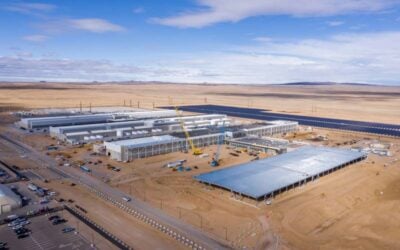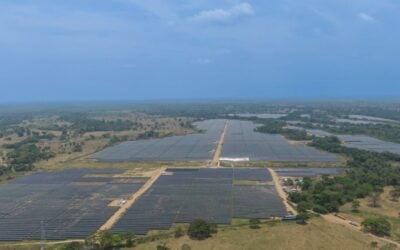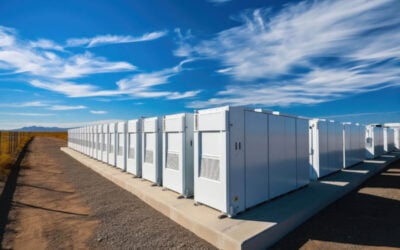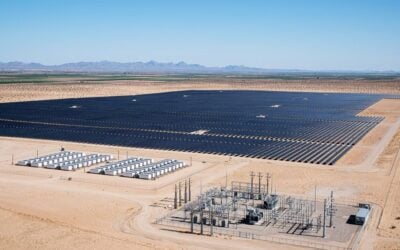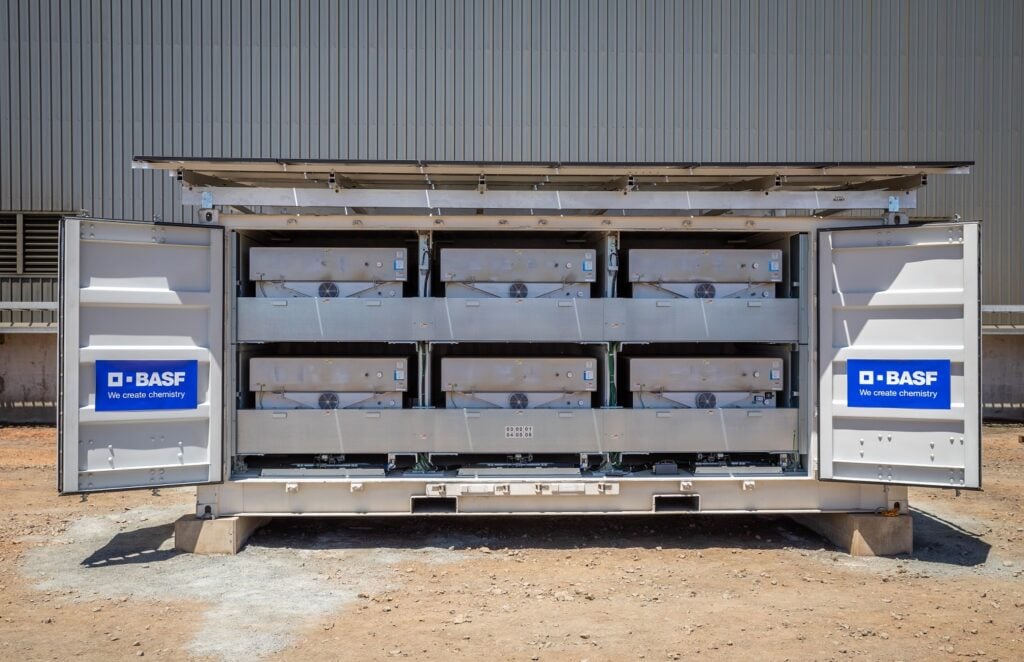
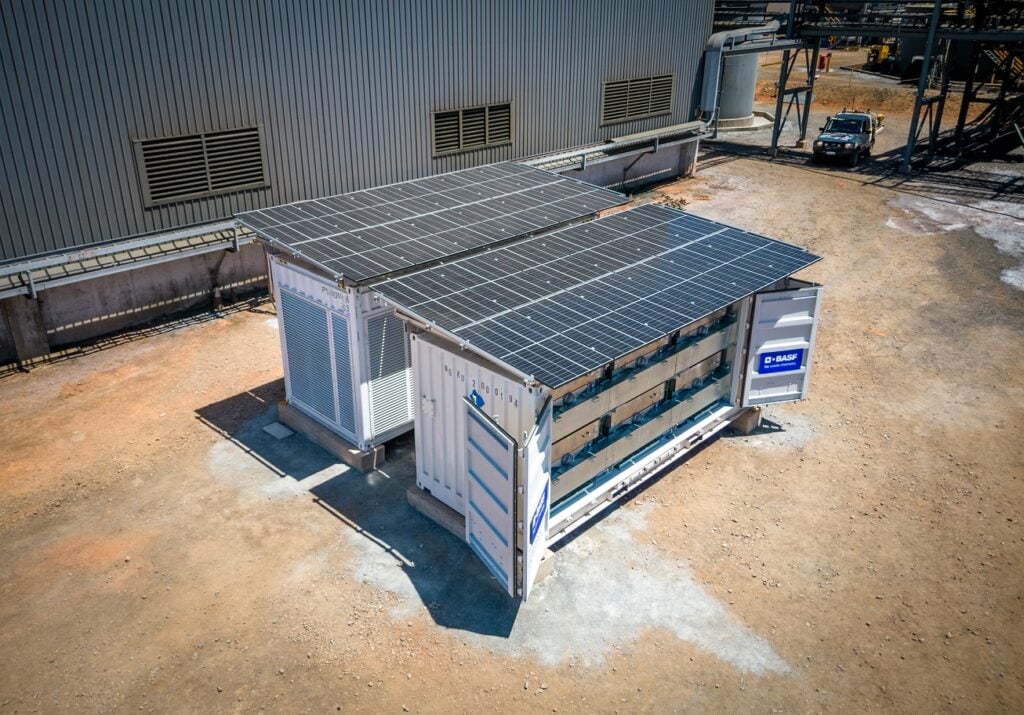
Invinity Energy Systems and chemicals company BASF have announced the first deployments of their non-lithium battery storage technologies in Hungary and Australia respectively.
Anglo-American Invinity makes its own vanadium redox flow battery (VRFB) energy storage systems, while BASF has the license to distribute the sodium-sulfur (NAS) battery storage technology developed by Japan’s NGK Insulators.
Enjoy 12 months of exclusive analysis
- Regular insight and analysis of the industry’s biggest developments
- In-depth interviews with the industry’s leading figures
- Annual digital subscription to the PV Tech Power journal
- Discounts on Solar Media’s portfolio of events, in-person and virtual
Both technologies are targeted at medium and long-duration energy storage (LDES) market segments, aiming to provide storage at discharge durations longer than the typical 4-hour upper limit at which lithium-ion is widely considered most economical.
Invinity said last week that it has sold a 1.5MWh vanadium flow battery to STS Group, a Hungarian renewable energy project developer. It will be installed at an STS solar-plus-storage project in central Hungary, near the municipality of Öskü.
The sale follows the signing of a multi-party commercial partnership agreement between Invinity, STS and the developer’s strategic partner Ideona Group, which is an asset management company also based in Hungary.
London Stock Exchange-listed Invinity said that the Hungarian partners have identified a potential pipeline of opportunities for VRFB deployments of more than 50MWh in the EU Member State. The flow battery maker has given its two partners a mandate to deploy its devices at solar-plus-storage and grid storage projects.
The initial 1.5MWh deployment will be coupled with a 2MWp solar PV array in an EU-funded project. Seven of Invinity’s VS3 model flow batteries will be installed with up to 6-hour discharge duration. Storing and dispatching surplus renewable energy, the batteries will provide grid-balancing ancillary services.
The project near Öskü will be owned by asset manager Ideona, and installed and integrated by STS Group, which won contracts for the project through a tender held by Hungary’s National Research, Development and Innovation Office.
Invinity has deployed or is contracted to deploy 65MWh of VRFBs at 70 sites in 15 different countries, with a factory in Scotland and offices and operations in the UK, Canada, the US, China and Australia.
Formed by the merger of the UK’s redT and North America’s Avalon Battery in 2020, some of the company’s bigger projects underway include a large-scale solar-plus-storage project in Alberta, Canada, a handful of US solar-plus-storage microgrids, a recent 15MWh order in Taiwan, and Australia’s first-ever grid-scale VRFB installation, a 2MW/8MWh system.
Field test for non-lithium battery tech at mining site
Staying with Australia, a nickel-copper-cobalt mine site in Western Australia is now host to the country’s first NAS battery installation.
It’s a demonstration project where the 250kW/1.45MWh sodium-sulfur system’s operation will be tested and assessed by the Queensland University of Technology’s National Battery Testing Centre together with the University of Western Australia.
Announced yesterday by the Future Battery Industries Cooperative Research Centre (FBICRC), a government, industry and academic research partnership launched by the Australian Government’s Cooperative Research Centre Program in 2019, the project is located at resources company IGO’s Nova mine site in Western Australia’s Fraser Range in the Outback.
FBICRC said the NAS battery system entered operation in mid-February.
The trial “is an important way to field test the suitability of this unique technology in a mining environment and how this will contribute to a clean energy future,” IGO acting CEO Matt Dusci said.
The NAS battery, commercially available for nearly two decades and with around 5GWh of capacity deployed at over 250 sites around the world, is being touted as suitable for storage applications requiring 6-8 hours duration.
Chemicals company BASF marked its entry into the energy market by forming a partnership with manufacturer NGK in 2019. Since then, Energy-Storage.news has reported on various projects announced by both NGK and BASF, including a 3.6MWh NAS battery for Mongolia’s first solar-plus-storage project, a 950kW / 5.8MWh system at a BASF production facility in Antwerp, Belgium, and various deployments in Japan and South Korea.
For both Invinity and BASF, the projects in Hungary and Australia are among the smaller projects they have supplied recently, but could be important in staking out their claim to wider rollout in each territory for their non-lithium technologies. Hungary is committed to achieving net zero emissions as a country by 2050, while in Australia FBICRC CEO Shannon O’Rourke said the NAS battery technology could “help to accelerate our clean energy future”.
Read more of Energy-Storage.news coverage of Invinity Energy Systems here, and more coverage of the sodium-sulfur NAS battery here.

